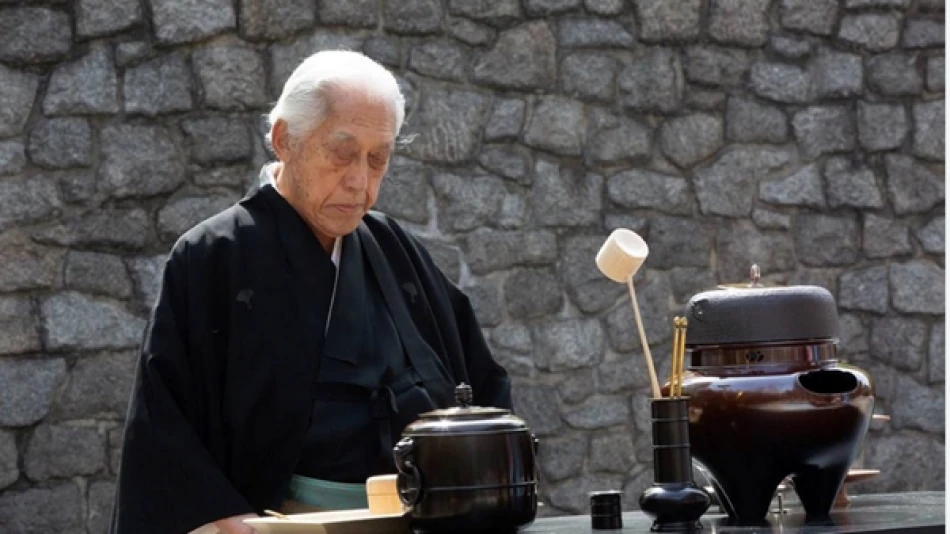
Renowned Japanese Tea Master Genshitsu Sen Passes Away at 102: A Legacy of Elegance and Tradition
Japan's Tea Master Who Turned a Cup Into a Symbol of World Peace Dies at 102
Dr. Sen Genshitsu, the 15th Grand Master of Japan's prestigious Urasenke tea school and a tireless ambassador of peace through traditional tea ceremony, has died at 102. His seven-decade mission to spread "peace through a cup of tea" took him to over 60 countries and transformed an ancient Japanese ritual into a bridge between cultures, religions, and nations during some of the most turbulent periods of modern history.
From World War II Pilot to Global Peace Ambassador
Genshitsu's life journey embodies Japan's own transformation from wartime aggressor to peaceful nation. Born in 1923 into the historic Urasenke family in Kyoto—descendants of the legendary tea master Sen no Rikyu (1522-1591) who founded the "wabi" style of tea ceremony—Genshitsu was drafted as a naval pilot during World War II. Fortunately, the war ended before he saw combat, allowing him to pursue a radically different path.
In 1951, just six years after Japan's defeat, Genshitsu made a bold decision that would define his legacy: he traveled to the United States to introduce Japanese tea ceremony to former enemies. This marked the beginning of an unprecedented cultural diplomacy campaign that would span continents and decades.
Tea Diplomacy at the Highest Levels
When Genshitsu became the 15th Grand Master of Urasenke in 1964, he elevated tea ceremony from a domestic cultural practice to an instrument of international relations. His guest list read like a who's who of global leadership: Queen Elizabeth II, Pope John Paul II, President George W. Bush, and Chinese leader Deng Xiaoping all experienced his tea ceremonies.
Breaking Down Cultural Barriers
Perhaps most remarkably, Genshitsu performed tea ceremony at the Vatican before the Pope—a moment that symbolized the universal language of hospitality and respect transcending religious boundaries. His meeting with Deng Xiaoping led to the establishment of tea ceremony educational institutions in China, helping to heal wounds between two nations with a complex historical relationship.
The Business of Cultural Soft Power
Genshitsu's approach offers valuable lessons for modern cultural diplomacy and international business. While countries today spend billions on public diplomacy campaigns, he achieved remarkable influence through the simple act of sharing tea. His method—emphasizing humility, respect, and mindful presence—created lasting personal connections that formal diplomatic protocols often fail to achieve.
Under his leadership, the Urasenke school expanded to 167 branches within Japan and established a significant global presence. This growth demonstrates how traditional cultural practices, when authentically presented, can find eager audiences worldwide—a model that luxury brands and cultural institutions continue to emulate.
Recognition and Legacy
Genshitsu's contributions earned him Japan's highest cultural honor, the Order of Culture, in 1997—making him the first tea ceremony practitioner to receive this distinction. France awarded him the Legion of Honor as Commander in 2020, while UNESCO appointed him as a Goodwill Ambassador. He also served as special assistant to Japan's Foreign Minister, institutionalizing his role in cultural diplomacy.
A Model for Modern Soft Power
Even after his official retirement in 2002, Genshitsu continued his peace mission well into his 90s. His approach contrasts sharply with today's often aggressive cultural export strategies. Rather than imposing Japanese culture, he invited others to experience it, creating space for mutual understanding and respect.
His death marks the end of an era in cultural diplomacy, but his model remains relevant as nations seek authentic ways to build bridges across political divides. In an age of digital communication and virtual meetings, Genshitsu's emphasis on physical presence, ritual, and shared experience offers a powerful reminder of what technology cannot replace: the simple human act of offering hospitality to a stranger.
Most Viewed News

 Layla Al Mansoori
Layla Al Mansoori






